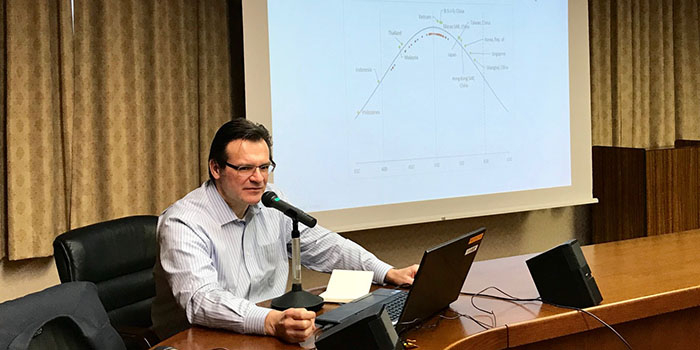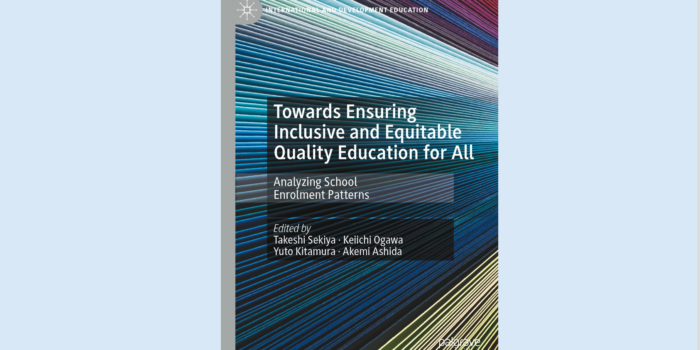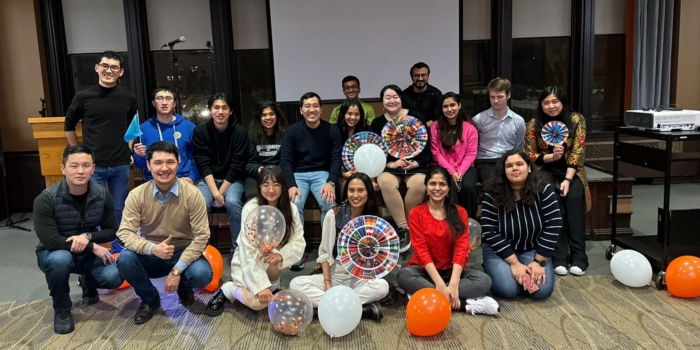
On March 2, 2018, Dr. Harry Anthony Patrinos, Practice Manager at the World Bank Headquarters delivered a Development Management Policy Seminar on “Automation and Implications for Developing Countries and Education Systems” in the Graduate School of International Cooperation Studies (GSICS) at Kobe University.
 Dr. Patrinos provided an overview of the return on investment to schooling and presented existing challenges facing some East Asian countries in providing basic education. These challenges render difficulties for such countries to stay abreast of evolving skills demanded in the job market driven largely by automation, which is prompted by the fourth industrial revolution. Countries with upper middle income and jobs requiring routine cognitive skills are at the highest risk with increasing automation in workplaces. Factors that reduce the risk of automation are longer years of education and high proficiency. Borrowing from case studies of Vietnam and Korea, productivity of schooling, focusing on fundamentals, employer-led training and engaging the private sector with public funding can be added to the factors that reduce the risk of automation. In conclusion, investing in relevant skills—namely, problem-solving, learning, communication, personal and social skills—as well as developing a curriculum for the future that nurtures well-rounded individuals are core measures to address the implications of automation in education systems.
Dr. Patrinos provided an overview of the return on investment to schooling and presented existing challenges facing some East Asian countries in providing basic education. These challenges render difficulties for such countries to stay abreast of evolving skills demanded in the job market driven largely by automation, which is prompted by the fourth industrial revolution. Countries with upper middle income and jobs requiring routine cognitive skills are at the highest risk with increasing automation in workplaces. Factors that reduce the risk of automation are longer years of education and high proficiency. Borrowing from case studies of Vietnam and Korea, productivity of schooling, focusing on fundamentals, employer-led training and engaging the private sector with public funding can be added to the factors that reduce the risk of automation. In conclusion, investing in relevant skills—namely, problem-solving, learning, communication, personal and social skills—as well as developing a curriculum for the future that nurtures well-rounded individuals are core measures to address the implications of automation in education systems.
At the end of the seminar, many participants engaged in an active Q&A session and discussion during which they asked questions to Dr. Patrinos and shared their views about the implications of the changing skill set for education priorities in developing countries. In his response, Dr. Patrinos reiterated the importance of measurement of learning, establishing standards, and embracing more innovation, competition, experiment, and openness that will allow developing countries to address increasing demands simultaneously.
Authored by Najung Kim (doctoral student)
Related Link
http://www.kobe-u.ac.jp/en/NEWS/event/2018_03_02_01.html
Related
Related Articles
This book presents a comprehensive case study analysis of school attendance patterns across 12 countries in Asia, Latin America, and Africa. By tracing the educational trajectories of children—from enrollment, through...
From August to December 2023, I participated in the exchange program at the Graduate School of Public and International Affairs (GSPIA) at the University of Pittsburgh in the United States....
From 9 March, 2015 to 20 March 2015, I participated in the 59th annual conference of the Comparative and International Education Society (CIES 2015), and the field study conducted by...


 Dr. Patrinos provided an overview of the return on investment to schooling and presented existing challenges facing some East Asian countries in providing basic education. These challenges render difficulties for such countries to stay abreast of evolving skills demanded in the job market driven largely by automation, which is prompted by the fourth industrial revolution. Countries with upper middle income and jobs requiring routine cognitive skills are at the highest risk with increasing automation in workplaces. Factors that reduce the risk of automation are longer years of education and high proficiency. Borrowing from case studies of Vietnam and Korea, productivity of schooling, focusing on fundamentals, employer-led training and engaging the private sector with public funding can be added to the factors that reduce the risk of automation. In conclusion, investing in relevant skills—namely, problem-solving, learning, communication, personal and social skills—as well as developing a curriculum for the future that nurtures well-rounded individuals are core measures to address the implications of automation in education systems.
Dr. Patrinos provided an overview of the return on investment to schooling and presented existing challenges facing some East Asian countries in providing basic education. These challenges render difficulties for such countries to stay abreast of evolving skills demanded in the job market driven largely by automation, which is prompted by the fourth industrial revolution. Countries with upper middle income and jobs requiring routine cognitive skills are at the highest risk with increasing automation in workplaces. Factors that reduce the risk of automation are longer years of education and high proficiency. Borrowing from case studies of Vietnam and Korea, productivity of schooling, focusing on fundamentals, employer-led training and engaging the private sector with public funding can be added to the factors that reduce the risk of automation. In conclusion, investing in relevant skills—namely, problem-solving, learning, communication, personal and social skills—as well as developing a curriculum for the future that nurtures well-rounded individuals are core measures to address the implications of automation in education systems.



